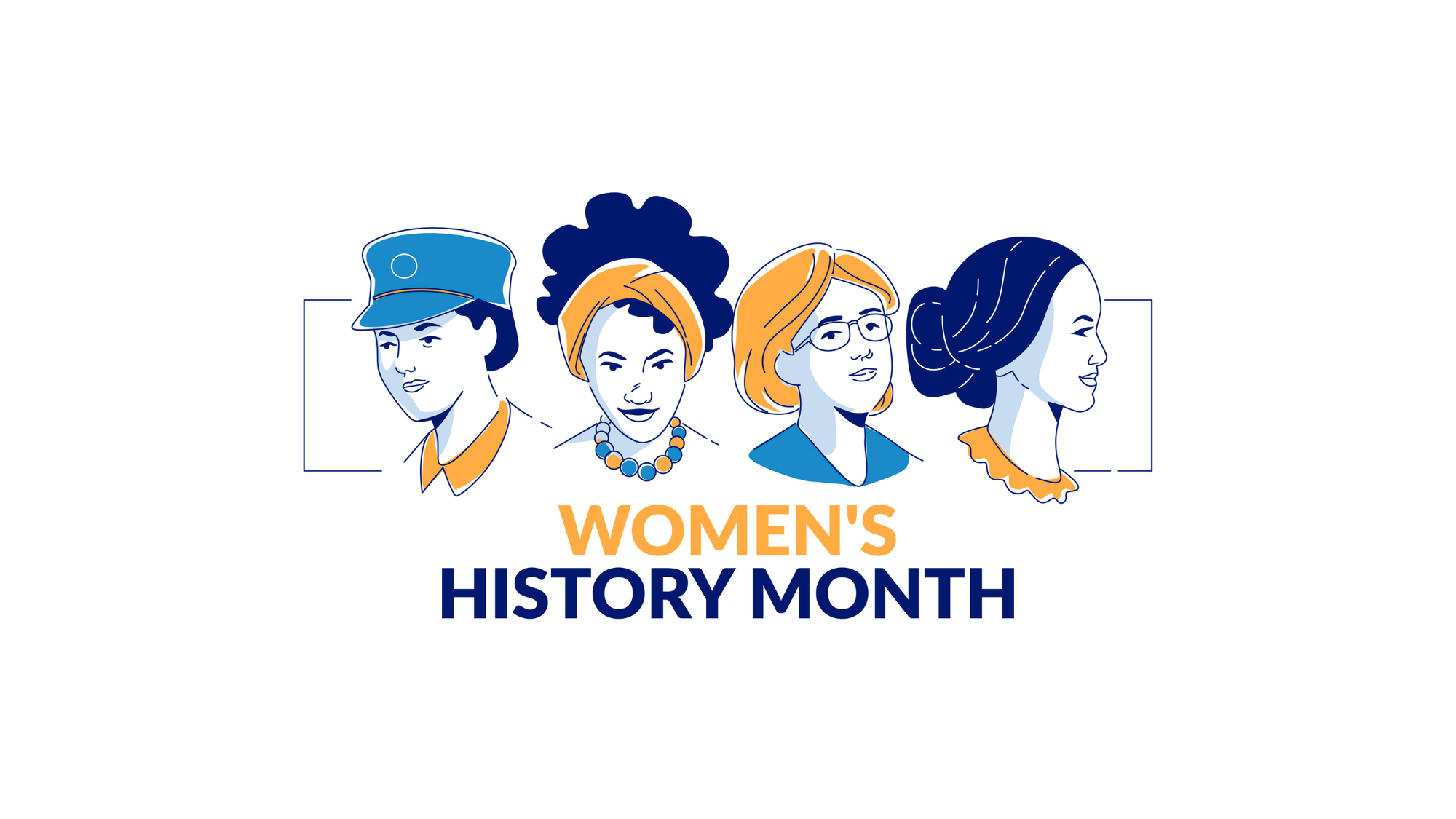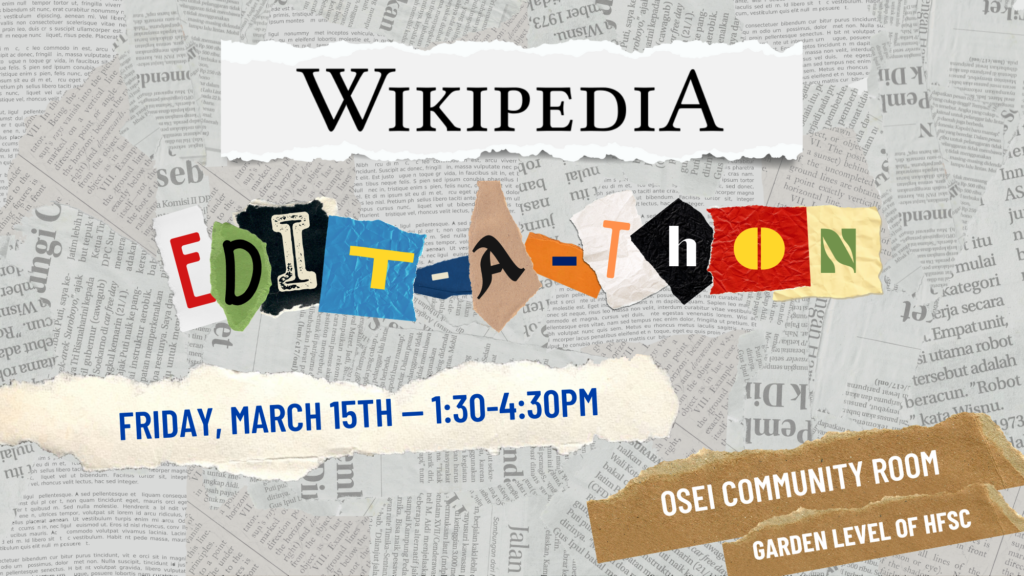Wikipedia Edit-a-thon: Make a Difference With Us This Women’s History Month
Written by Carrie McDonald, MDI Journalism Intern
This Women’s History Month, seize the opportunity to make a difference by writing the stories of women throughout history and the present day who have been omitted from today’s narrative.
The Massive Data Institute (MDI) joins teams across Georgetown University in embracing the University theme for Women’s History Month: “Rage Renaissance: Challenging Gendered and Racialized Narratives.” Embracing feminist rage as a forceful tool for activism, MDI is partnering with organizations across the Georgetown community to host a Wikipedia Edit-a-thon event on March 15, aiming to confront the biases entrenched across the platform and society.
Despite constituting almost half of the U.S. workforce and even outnumbering men in the U.S. college-educated workforce, women remain underrepresented in leadership positions across almost all industries. According to the Pew Research Center, women make up only: 10.6% of Fortune 500 CEOs; 32.8% of college and university presidents; 32.7% of seats in state legislatures; 24% of state governorships; and 25% of U.S. Senators. Biases and inequities can continue when segments of the population are excluded from these leadership roles. Adding to the concerns, even though women consistently outpace men in earning college degrees and comprise 55% of Georgetown’s student body, a stark disparity exists in STEM fields, where only 20% of computer science, 22% of engineering degrees, and 21% of physics degrees are awarded to women nationwide.
Tackling Wikipedia’s Gender Gap
This lack of women in leadership and the sciences is compounded by the reality that their historical and current contributions sometimes go unnoticed. Wikipedia is an influential source of information in modern society, amassing over 800 million unique viewers on English-language Wikipedia articles in February 2024 alone. However, Wikipedia reflects the same systemic societal biases, as well as the biases of its editors — only 10% of whom identify as women.
For instance, women are represented in only 19% of the over 1.5 million published biographies on English-language Wikipedia. Women of color make up the smallest proportion of these biographies. Sexist language has also been found in some of the existing biographies.
As a tertiary source, Wikipedia’s editors are required to cite secondary sources that are verifiable when creating articles, which poses an extra barrier toward closing the gender gap, according to Ariel Cetrone of Wikimedia District of Columbia , DC’s chapter affiliate of Wikimedia.
“Wikipedia’s editors must cite verifiable secondary sources when creating articles,” Cetrone said. “The gender gap that exists in scholarly research and other publications perpetuates Wikipedia’s gender gap. In other words, if a secondary source does not exist to support one’s notability, an article cannot be created. This creates a challenge for editors aiming to close the gap.”
Nevertheless, in the face of a historical narrative that has consistently overlooked the contributions of women, those celebrating Women’s History Month are not powerless. Instead, all of us can take proactive steps to reintegrate women’s stories into history and the contemporary narrative. That is the purpose of the upcoming March 15 Edit-a-thon .
The shared goal of creating new pages for notable women currently not included in Wikipedia and enhancing those underrepresented biographies of women is both inspiring and meaningful.
Beth Campolieto Marhanka, the head of outreach and engagement at Georgetown University Lauinger Library
Georgetown University’s Women’s History Month Wikipedia Edit-a-thon
Participating in the edit-a-thon is a simple yet impactful way for anyone to correct the historical omission of women. The entry point is accessible to all; the event will start with training by Wikimedia DC, a chapter affiliate of Wikimedia that supports between 20 and 30 Wikipedia edit-a-thons each year.
“About 80% of those attending Wikimedia DC’s edit-a-thons have never edited Wikipedia,” Cetrone said. “Training is always provided for new editors at our edit-a-thons.
MDI’s aspiration extends beyond the edit-a-thon’s immediate impact, though. The Institute hopes that participants not only achieve tangible results on the day, but also leave feeling empowered to continue editing in their free time and playing a critical role in reshaping and improving Wikipedia’s coverage over time.
Carole Sargent, the director of Georgetown’s Office of Scholarly Publications, which is partnering with MDI and other organizations to host the March 15 event, was first inspired to start Wikipedia editing after Lauinger Library hosted an edit-a-thon in 2022 during National Poetry Month to amplify biographies of poets of color.
“Inspired by them, I learned to create women’s biographies, and joined the Wikipedia group Women in Red,” Sargent said. “[The group] generates lists of women who need bios (red links) that turn blue after one is published. I’ve published 28 original biographies to date, of which 23 are of women, and 17 are prominent Roman Catholic sisters.”
As of the writing of this article, MDI is partnering with the Beeck Center for Social Impact + Innovation, Georgetown University Art Galleries, Georgetown University Library, Georgetown Women’s Alliance, Georgetown University Women’s Center, GU Politics, GU Women Coders, Office of Scholarly Publications, and the Women’s and Gender Studies Program.
“The Library is excited to co-host this important initiative to close the gender gap on Wikipedia,” Beth Campolieto Marhanka, the head of outreach and engagement at Lauinger Library, said. “We’re also thrilled to partner with the Massive Data Institute, Georgetown University Women’s Center, Office of Scholarly Publications, and others from around campus to bring a more diverse group of editors to Wikipedia. The shared goal of creating new pages for notable women currently not included in Wikipedia and enhancing those underrepresented biographies of women is both inspiring and meaningful.”
Header Image by Freepik.


